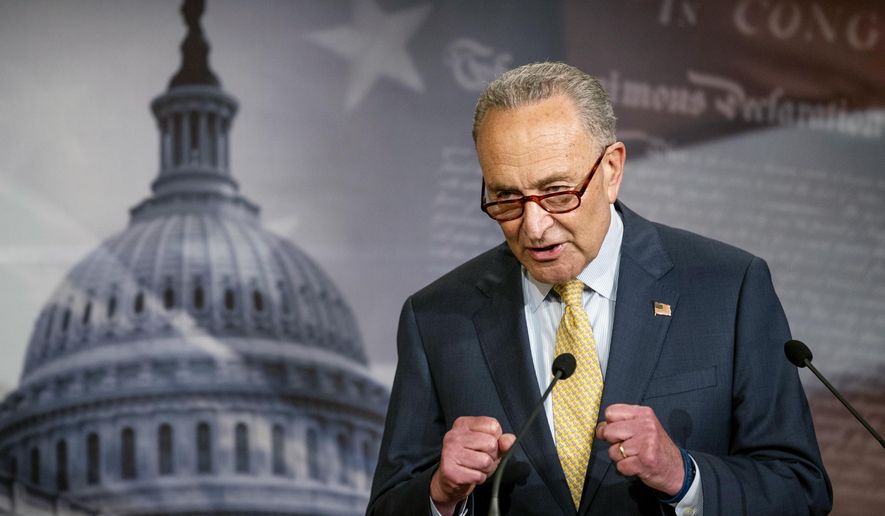The rush to overhaul America’s police forces ran into partisan gridlock Wednesday on Capitol Hill, where Democrats mounted a filibuster to prevent the Senate from taking up a bill, wagering they can use the issue against Republicans in November’s elections.
GOP lawmakers urged the Senate to at least begin debating the matter, saying even if Democrats didn’t like the bill written by Sen. Tim Scott, the only Black Republican in the chamber, there would be time for amendments.
Democrats said Mr. Scott’s bill, heavy on incentives but light on mandates for state and local police, didn’t go far enough to be worth starting the debate. They led a filibuster, leaving Republicans four votes shy of the 60 needed to begin action.
Mr. Scott denounced the blockade, saying it is squandering a pivotal moment to make progress on the race conversation that has engulfed the nation for the past month.
“It’s one of the reasons why communities of color, young Americans of all colors, are losing faith in the institutions of authority and power in this nation — because we’re playing small ball,” the South Carolina senator said. “The actual problem is not what is being offered. It’s who is offering it.”
He said Democrats are counting on defeating President Trump and gaining seats in Congress in November, meaning they’ll have more control over what a bill looks like if it’s written next year, rather than now.
Indeed, Democrats are confident that Republicans would take the blame.
“The political risk falls on Senate Republicans, not the Democrats. The failure of the Senate GOP majority to embrace major reform is just the latest in the long line of Republicans being on the wrong side of public opinion,” Brad Bannon, a strategist, told The Washington Times.
Yet Democrats also insisted their filibuster wasn’t the end of the process. Instead, they characterized it as a negotiating tactic, seeking to win concessions from Majority Leader Mitch McConnell, Kentucky Republican, on the provisions in the bill and guarantees about how it will be debated on the Senate floor.
“Mitch McConnell has a way of trying to bully us around, and he thinks he can get his way,” said Senate Minority Leader Charles E. Schumer, New York Democrat.
Democrats are also confident that they’ll have their own ante in the conversation later this week, when the House, which they control, is expected to approve a more aggressive police overhaul.
The Republican package stayed away from implementing national mandates on police departments, saying the Constitution limits the federal government’s ability to dictate changes to local agencies.
It instead pushed for better data on use of force and offers incentives to departments to ban chokeholds. The GOP bill also provides grants for training resources and body cameras, with penalties for improper use of the recording devices, filing false police reports, or serious bodily injuries that lead to prosecution.
Democrats said that was a “watered-down” approach.
Their bill would create a national standard for use of force and would remove limited qualified immunity from officers carrying out their duties, opening the door for them to face civil lawsuits over their actions.
Mr. Scott said Republicans were ready to debate those issues, but they needed to take up the bill first. He estimated there is about a 70% overlap with the Democrats’ bill, a statistic Democrats reject.
Mr. Schumer said the bill is too fundamentally flawed to be saved by amendments.
“Why don’t we put a good bill on the floor that can pass?” he said.
He said Democrats used the same tactics on previous legislation having to do with the coronavirus outbreak, forcing Mr. McConnell to come to the table.
“I believe that the Republican Party sees the handwriting on the wall,” he said.
President Trump said Senate Democrats blocked the bill “because they want to weaken our police.”
“They want to take away immunity,” Mr. Trump said at a White House press conference. “They want to take away a lot of the strength from our police and from law enforcement generally, and we can’t live with it.
“This [Republican proposal] is a great bill,” he said. “Mitch wants it to happen. I would like to see it happen, but we won’t do anything that’s going to hurt our police.”
He said if the parties can’t agree, “it’s one of those things — different philosophies.”
House Speaker Nancy Pelosi, California Democrat, last week had signaled she would be open to matching her bill up against the Senate GOP proposal in a conference committee, where the two sides would hammer out a final agreement.
But on the eve of the Senate vote, she backed Mr. Schumer’s blockade. She went as far as to accuse Republicans of “trying to get away with murder — the murder of George Floyd.”
Floyd is the Black man whose death last month under the knee of a Minneapolis police officer sparked the current debate on policing and race.
Mrs. Pelosi refused to apologize for her remark and Mr. Schumer backed her.
“What she said was fine with me,” he said.
Mr. Scott said Mrs. Pelosi’s comments were “one of the most heinous things I can imagine.” He said it’s an indication of the way Democrats take for granted the support of Black communities.
He touted several priorities Republicans have passed to benefit those same communities — including funding for historically Black colleges, opportunity zones, and research on sickle cell anemia.
“She knows that she can say that because the Democrats have a monopoly on the Black vote,” he said. “And no matter the loyalty of the people, the return they get will always continue to go down because in monopolies you start devaluing your costumers.”
“I’m willing to compete for their vote. Are you?”
⦁ Dave Boyer contributed to this report.
• Gabriella Muñoz can be reached at gmunoz@washingtontimes.com.
• David Sherfinski can be reached at dsherfinski@washingtontimes.com.




Please read our comment policy before commenting.